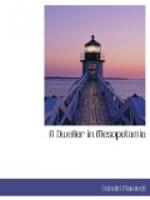“For the Lord God had not caused it to rain upon the earth, and there was not a man to till the ground.
“But there went up an inundation from the earth, and watered the whole face of the ground.”
The description of the planting of the garden is very suggestive of a tract of bare land to which irrigation has been brought. “And out of the ground made the Lord God to grow every tree that is pleasant to the sight.” The garden, too, is watered, not by rainfall, but by a river which parts into different heads, as do the Tigris and Euphrates when they spread out upon the flat alluvial land below Baghdad.
Compare the “scenery” in St. John’s Revelation with that of the writer of Genesis when the kings of the earth and the great men sought to hide from the wrath of God. They “hid themselves in the dens and in the rocks of the mountains; And said to the mountains and rocks, Fall on us and hide us.”
Adam and Eve could hide themselves only “amongst the trees” of the garden.
[Illustration: SHEIK SAAD AND THE PERSIAN MOUNTAINS]
The story of Noah and the flood has a very close parallel in a record of Berosus, the Babylonian priest Xisuthros had a dream in which the deity announced to him that on a certain day all men should perish in a deluge of water, and ordered him to take all the sacred writings and bury them at Sippar, the City of the Sun, then to build a ship, provide it with ample stores of food and drink and enter it with his family and his dearest friends, also animals, both birds and quadrupeds of every kind. Xisuthros did as he had been bidden. When the flood began to abate, on the third day after the rain had ceased to fall, he sent out some birds to see whether they would find any land, but the birds, having found neither food nor place to rest upon, returned to the ship. A few days later Xisuthros once more sent the birds out; but they again came back to him, this time with muddy feet. On being sent out again a third time they did not return at all. Xisuthros then knew that the land was uncovered, made an opening in the roof of the ship, and saw that




